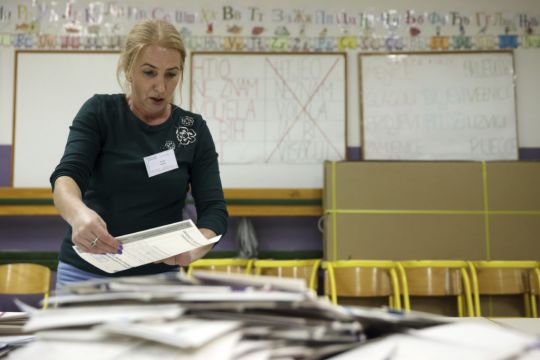Polls have closed in Bosnia’s general election in which voters chose their new leaders from a long-established cast of sectarian candidates and their challengers who pledged to eradicate corruption in government.
Moments after vote counting started, Bosnia’s international overseer, Christian Schmidt, announced in a YouTube video that he was amending the country’s electoral law “to ensure functionality and timely implementation of election results”.
He assured citizens in the video that the changes “will in no way affect” the votes cast on Sunday for different levels of government that are part of one of the world’s most complicated institutional set-ups.
Bosnia’s powersharing system was agreed in a US-sponsored peace deal that ended the brutal 1992-95 war between its three main ethnic groups – Muslim Bosniaks, Orthodox Serbs and Catholic Croats – by dividing the country into two highly independent entities.

The entities — one run by Serbs and the other shared by Bosniaks and Croats – have broad autonomy but are linked by shared national institutions. All countrywide actions require consensus from all three ethnic groups.
The agreement also gave broad powers to the international high representative, the post currently held by Mr Schmidt, including the ability to impose laws and to dismiss officials and civil servants who undermine the country’s fragile post-war ethnic balance.
The Sunday election included races for the three members of the shared Bosnian presidency; parliament deputies at the state, entity and regional levels; and the president of the country’s Serb-run part.
The traditional ruling class was challenged in the election by parties which, despite ideological differences and sometimes clashing agendas, shared the campaign promise to eradicate patronage networks and sanction acts of corruption in government.
Analysts predicted the long-entrenched nationalists who have enriched cronies and ignored the needs of the people were likely to remain dominant after the election despite disappointing their constituents, largely because the sectarian post-war system of governance leaves reform-minded Bosnians with little incentive to vote.
However, contenders vying to replace the nationalists on the country’s tripartite presidency and in the post of the president of its Serb-run part insisted the preliminary results indicated they were wining the vote.
Election turnout on Sunday was 50 per cent or over two percentage points down from the 2018 general election.







